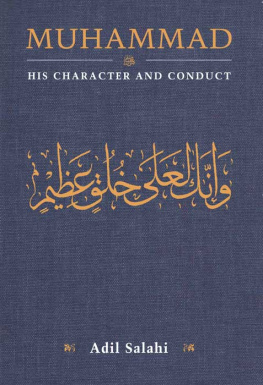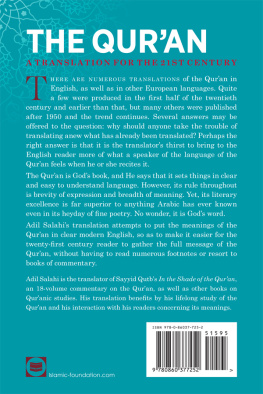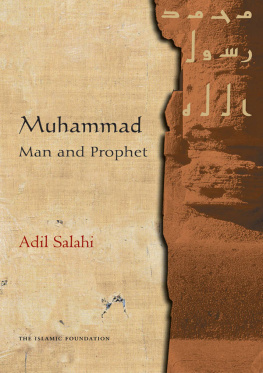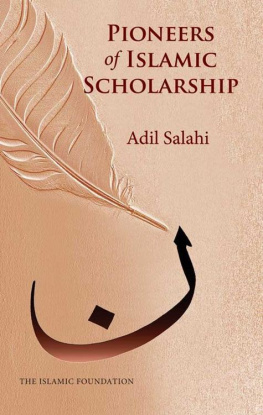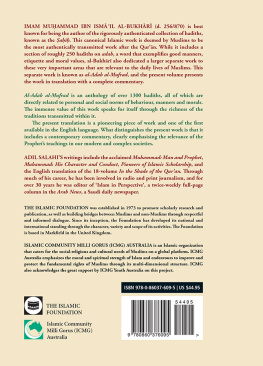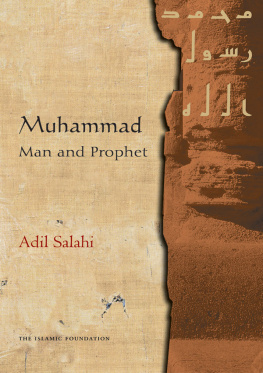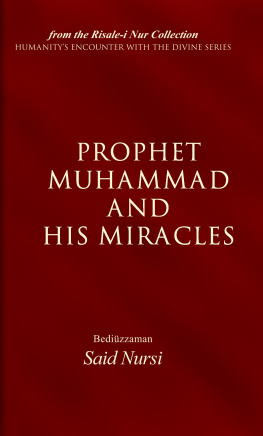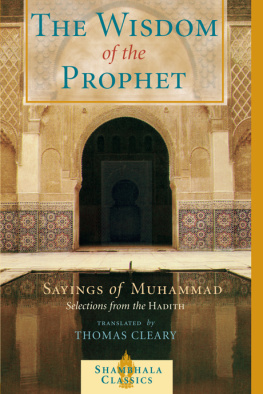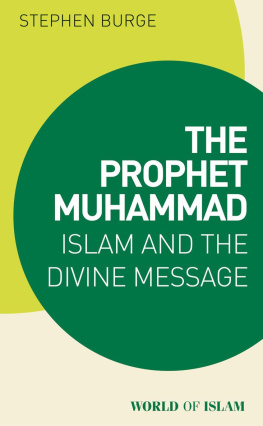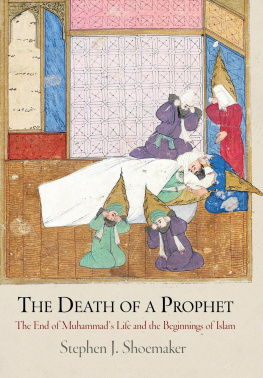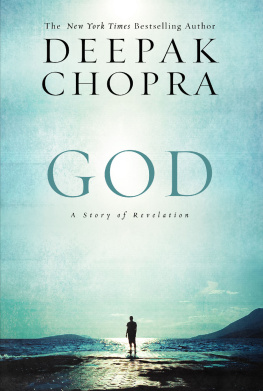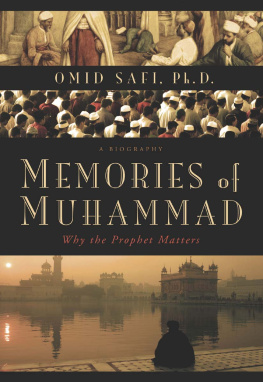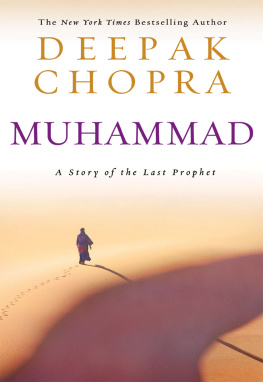MUHAMMAD

HIS CHARACTER AND CONDUCT
Adil Salahi
THE ISLAMIC FOUNDATION
Muhammad: His Character and Conduct
Published by
THE ISLAMIC FOUNDATION
Markfield Conference Centre
Ratby Lane, Markfield
Leicestershire, LE67 9SY
United Kingdom
E-mail:
Website: www.islamic-foundation.com
Quran House, PO Box 30611, Nairobi, Kenya
PMB 3193, Kano, Nigeria
Distributed by
Kube Publishing Ltd.
Tel: + 44 (0)1530 249230, Fax: + 44 (0)1530 249656
E-mail:
Adil Salahi, 2013
All rights reserved
The right of Adil Salahi to be identified
as the author of this work has been asserted
by him in accordance with the Copyright,
Designs and Patents Act, 1988.
Cataloguing-in-Publication Data
is available from the British Library
ISBN 978-0-86037-561-6 paperback
ISBN 978-0-86037-566-1 casebound
ISBN 978-0-86037-568-5 e-book
Typesetting by: N A Qaddoura
Cover Design by: Nasir Cadir
Printed by: Gutenberg, Malta

DEDICATION
To
Hussain Abu Dawood
In acknowledgement of his unfailing support and encouragement to write this book

CONTENTS

TRANSLITERATION TABLE
Consonants. Arabic
initial: unexpressed, medial and final: 
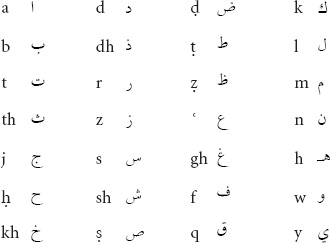
Vowels, diphthongs, etc.
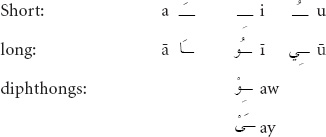

INTRODUCTION
HE HAS INFLUENCED my life in great measure. I have known him since I was very young, even though he lived 1400 years ago. My parents taught me to love him as though he was the light that guided our family. My primary school teachers nurtured this love further, and in my first year of secondary school my teacher gave me a book about his life as a prize for being at the top of the class in Arabic. In my first professional work I dramatized a major part of his life for radio. I later wrote a book about the events of his life, and that book has been reprinted several times. For thirty-one years from 1981 to 2012, I edited a weekly column entitled Islam in Perspective for the Saudi paper, Arab News, and each time I wrote an article about him or what he taught. I still feel that all this falls far short of what he deserves. How can I or indeed anyone portray what he has given to humanity, when he remains the light that brings pure happiness to the life of millions across the world?
Muhammad ibn Abdullh, born in Makkah in 570 CE to a father on whose face he never set eyes, was the man to whom God entrusted the task of delivering His final message to mankind. God undertook to preserve this message for the rest of human life. The task assigned to Muhammad was enormous. His was not merely a message to be delivered and signed for; he was to provide guidance for contemporary and future generations on its implementation. His guidance is the light that shines through every community that decides to abide by how God wants humanity to live. A guidance that will continue to apply to every individual and every community for as long as human life continues.
This was the Prophets miracle. He did not tell people that he would work miracles for them, or show them spectacular feats that left them stunned with amazement. Instead, he offered a system of life that provided for all the needs of body, soul and emotions. Moreover, he elevated their aspirations towards a sublime ideal. Through his actions, he showed them the way to achieve all this in a very simple, direct and honest manner. What they had to endeavour to achieve was within everyones reach. There were no complications or arbitrary impositions.
Hundreds of books have been written about the Prophet and the events of his life. The majority of these are by Muslims who have loved and followed him; although some are by detractors whose standpoint is to reject him and his message. Usually, the more a person learns about the life and message of the Prophet, the more they admire him.
In his first forty years, before the start of his message, Muhammad lived among his people: sharing their concerns, but steering away from anything that was wrong or unbecoming. He made a name for himself as an honest and truthful person. Later, fleeing assassins, he was chased into the desert with a great prize set on his head; yet his trust in God and in the truth of his message remained as firm as a mountain. At one point the danger was close and Surqah, his pursuer, was ready to strike, yet he promised Surqah that he would wear the bracelets of Khusru, the Persian Emperor. That promise was to come true after Muhammad had passed away.
Within less than ten years, the life of the Prophet underwent a great change. That rider, travelling with two men and a guide along 500 kilometres of unfamiliar roads in the Arabian desert to escape his pursuers, became the undisputed master of the whole of Arabia. He built a state that was dedicated to the truth and justice and to the liberation of man throughout the world. He wrote to Emperors, kings and rulers, calling on them to believe in God and to follow His message; yet at the same time he lived a life of poverty. He did not disdain to accept an invitation from a poor person, and would gladly share a humble dinner of bread with fat that had started to rot. One day, he came home to eat but the only food available in his home was a small portion of bread and some vinegar. His comment at this was: Vinegar is fine food to go with bread. He said this at a time when he could have had the finest riches the world could provide.
I have said that his trust in God was as firm as a mountain. Indeed, mountains might come crashing down, and yet the Prophets faith would remain unshaken. At moments of extreme danger, he was full of confidence that the truth he preached would triumph. At the moment of his greatest triumph he showed humility and gave due thanks to the Almighty. With yesterdays enemies the very ones who plotted his assassination and determined to exterminate his community at his mercy, he was remarkably magnanimous. The sight that gave him most satisfaction at the end of his blessed life was that of his followers offering a congregational prayer in his mosque. He felt then that he had delivered Gods message and fulfilled his task.
Today, the Prophet is much maligned by writers, cartoonists, bloggers and various other detractors whose information about him is both scanty and false. He is attacked, particularly, on three issues: his many marriages, his marriage to ishah (who is said to have been a child at the time) and his treatment of the Jews, particularly the Qurayah tribe. An in-depth study of all these issues shows that there is nothing to criticize. Nevertheless, the attack continues. Unfortunately, most Muslims today do not know the Prophet well enough to portray his life in its true colours. Rather, when these attacks are made anger is heightened throughout the Muslim world. This serves to deepen the rift between Muslims and non-Muslims: particularly between the Muslim world and the West. This is contrary to what most people throughout the world want. Better understanding is needed on both sides of the divide.
Next page
